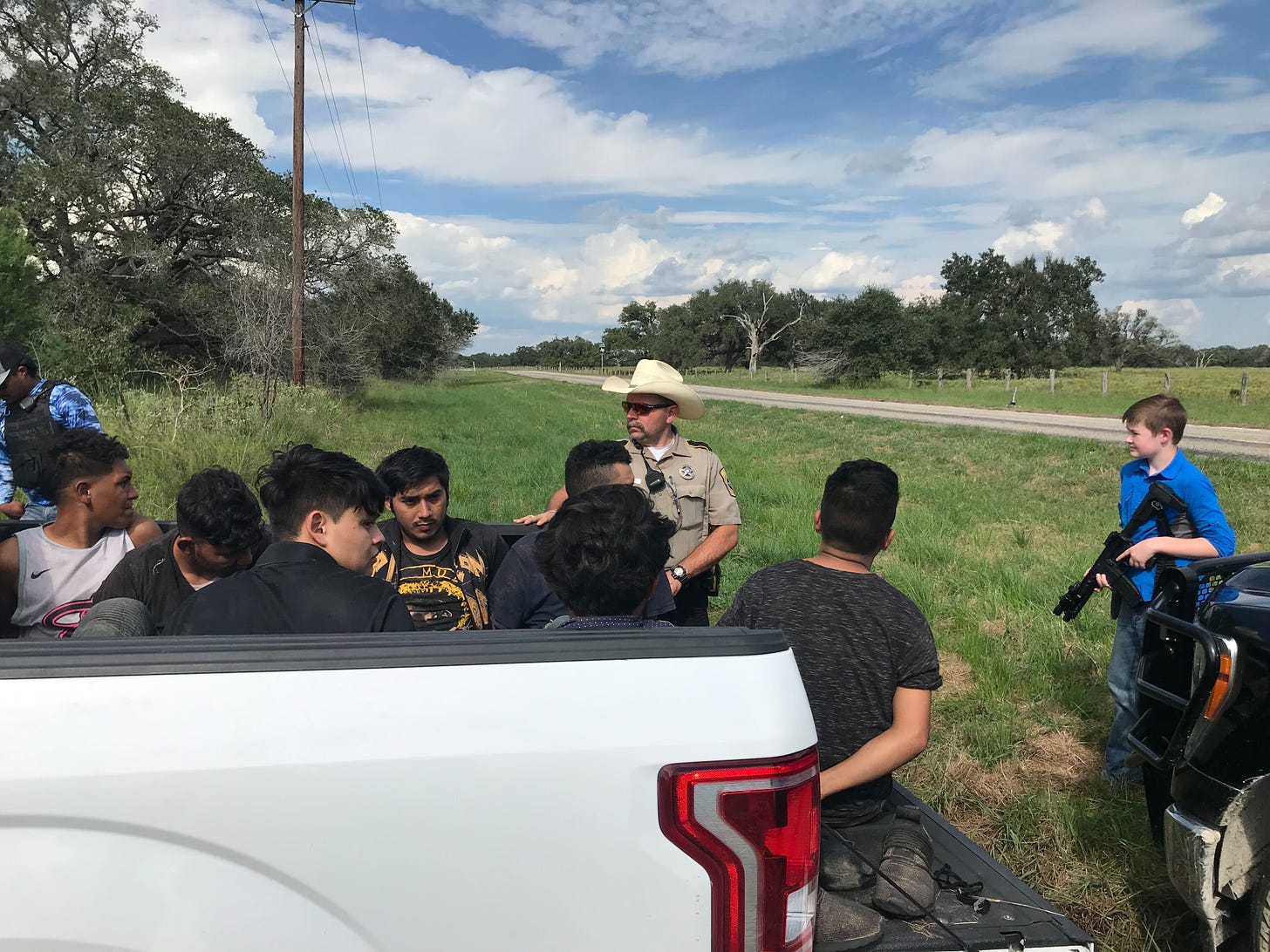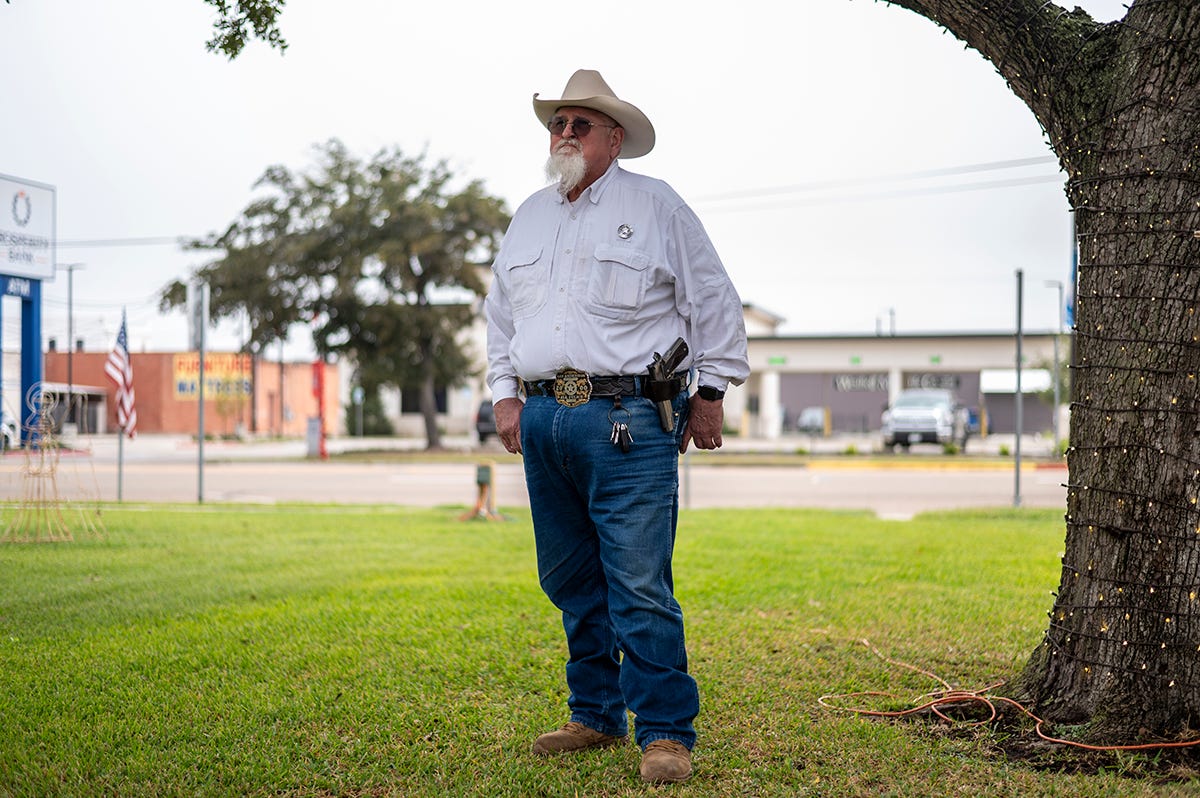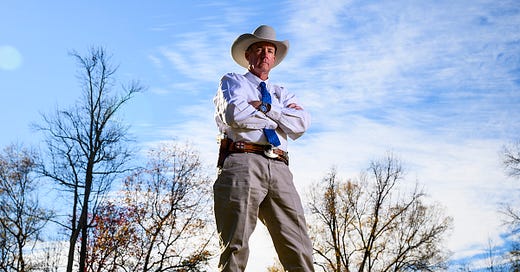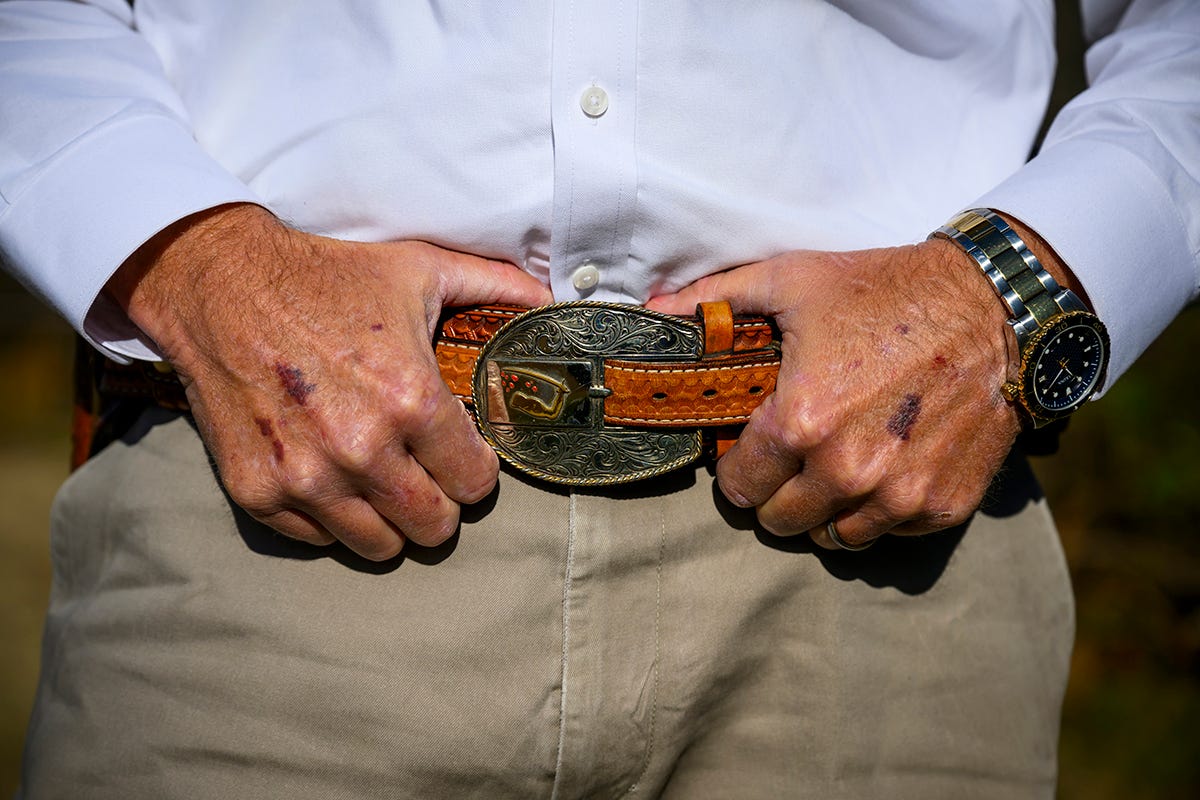
The Free Press

One Sunday morning in 2021, Sheriff Roy Boyd and his 12-year-old son pulled out of their church’s parking lot and turned on to Highway 59 in Goliad County, Texas—a small county located about 25 miles from the Gulf of Mexico.
On the highway, Boyd passed a white pickup truck and noticed fingers from many different hands sticking out from underneath a sheet of plywood that covered the truck bed. He knew immediately: Migrants were being smuggled into the country.
He quickly called dispatch, but no deputies were available at the time.
“Hold on,” said Boyd, turning to his son. “We’re gonna have to stop them, and they’re gonna run.”
Boyd flipped on his police lights, and the truck suddenly appeared in his sights. He chased after the truck until it veered into the brush and crashed through a fence, its doors flying open as a dozen or more illegal immigrants scattered in different directions.
“Stay down!” Boyd yelled to the handful of men who hadn’t gotten far. Outnumbered, he handed his semiautomatic AR-15 to his son so he could handcuff about seven men until reinforcements arrived.
“My kids were raised with guns,” said Boyd. “So my son knew how to handle it.”

Highway 59, which bisects Goliad County, runs from the border town of Laredo, Texas, up through Houston. The Mexican cartels have long used it to smuggle drugs and migrants. In 2021, after the Biden administration effectively opened the southern border, Sheriff Boyd and his deputies found themselves in dangerous pursuit of cartel vehicles on practically a daily basis, chasing human smugglers as they cut through the county on their way north.
Boyd decided that he couldn’t afford to wait for a new administration to change the border policy. As he saw it, the cartels were already operating inside his town, and he wanted them gone. Since cartel operations within the U.S. are notoriously difficult to investigate and dismantle, getting rid of them meant developing a new, innovative approach to law enforcement. That’s what he set out to do.
The full extent of the cartels’ infiltration into the country is impossible to gauge. What is known, according to a new report by the Drug Enforcement Administration, is that the Mexican Sinaloa and Jalisco cartels now reach into all 50 states, causing the “worst drug crisis in U.S. history.” And Biden’s open-border policies have made the cartels richer and more powerful than ever before. Smuggling humans across the border quickly became a top revenue stream for the transnational criminal organizations, bringing in between $4 and $12 billion per year.
Ammon Blair, former border patrol agent and senior fellow at the Texas Public Policy Foundation, says that cartels work inside a “gray zone” that allows them to conduct criminal operations under the radar. “We don’t have a system in the U.S. that identifies where the cartels are operating,” says Blair. Cartels gather intelligence on U.S. agencies, and they subcontract their criminal operations to local gangs, which allows them to distance themselves from direct involvement. “This allows cartels to maintain a significant presence within the U.S. while minimizing the risk of detection and disruption by law enforcement.”
As part of his agenda, president-elect Donald Trump has vowed to “wage war on the cartels,” and he says he’ll end human trafficking using Title 42, a law that prevents border crossings for public health reasons, by immediately returning trafficked women and children to their countries of origin. He might also consider having his administration support the efforts like the one started by Sheriff Boyd.
Back in 2021, Goliad County citizens like Arthur Martin, a cattle rancher, saw their property damaged by illegal immigrants who cut through their land on foot. Under the cloak of night, trespassers sliced through Martin’s barbed wire fence line, causing his cows to escape into his neighbor’s yard. His RV, which he parks in his barn about 100 feet behind his house, was broken into several times.
“My wife gets up to go to work when it’s still dark, and I used to have to escort her off the property,” said Martin. “It’s difficult to explain the stress you feel when you know that your property isn’t secure.”
It got so bad that Goliad County judge Mike Bennet issued a declaration of disaster in April of 2021, stating that his district “is under imminent threat of disaster from the human trafficking occurring on our border with Mexico.”
Three months later, Governor Greg Abbott held a roundtable with sheriffs from border towns. There, Boyd pitched him an idea—a state grant that would allow local law enforcement agencies to share personnel, resources, and budgets to effectively drive cartel operations out of their counties for good. He called it Operation Lone Star Task Force.
Abbott granted Boyd $1 million to start the task force. Upon receiving the funds, Boyd hired two investigators, whose sole job was to probe cartel-related criminal activity, and three deputies to patrol the roadways and intercept smugglers.
Boyd’s operation was a pretty radical innovation from the way local law enforcement agencies usually work. Normally, police and sheriffs’ departments operate in silos: They stay within their county lines, control their own budgets, and rarely share information and resources. Operation Lone Star Task Force, which has grown from nine law enforcement agencies to 52 agencies across Texas since it began three years ago, does the opposite. The state grant allows local law enforcement agencies to cross county lines, share intelligence, and work together on investigations.
“By leveraging the human intelligence obtained by local and state law enforcement, we can dismantle organized crime all across the United States,” said Boyd. “We have to spend the next four years working our asses off and taking away the cartel’s ability to generate revenue.”
So far, intel collected during vehicle pursuits and interdictions has led the task force to locate numerous stash sites—often abandoned properties—that criminal gangs use to switch cars and pick up and drop off the migrants they’re smuggling. In 2022, alongside Homeland Security Investigations and Houston law enforcement agencies, the task force arrested upper- and mid-management members of a large human smuggling ring, which immediately reduced smuggling activity in jurisdictions along Highway 59. One two-year investigation took down an organization called Teteca that smuggled in an estimated 100,000 people a year. “It was the single largest smuggling contractor for the Gulf Cartel at the time, and it took two years, but we completely dismantled that group,” said Boyd.
In 2023, an Operation Lone Star Task Force officer in Goliad County pulled over a woman who admitted to smuggling dozens of people from the border to Rosenberg, Texas, located just southwest of Houston, every month. She told investigators that she was paid $3,000 per trip, and that the organization employing her allegedly relied on a Border Patrol insider to avoid detection. She was found with $86,000 in cash taped to her torso.
Sheriff Kelly Janica of Jackson County, Texas, which is north of Goliad County and is also split by Highway 59, views the task force as a new form of proactive policing.
“Some law enforcement officers might think ‘We’ll just let them pass through our county and go on to the next,’ but that would mean turning criminals loose to prey on other Texans,” said Janica. “I wasn’t going to let that happen.”

On several occasions, Janica told The Free Press, his deputies and task force members have pulled over illegal immigrants who were transporting children. “The children didn’t know who they were with,” he said.
Operation Lone Star Task Force has been successful enough that the cartel-linked smuggling rings have had to change their route to avoid Highway 59. “We’ve pushed them west toward New Mexico, and we’re holding the line,” said Janica.
In 2022, Sheriff Boyd discovered that a Mexican cartel was passing around a photo of him. In the picture, he is standing by a warning sign he had posted at the entrance to Goliad County, which reads in Spanish: Warning: Traffickers of humans and drugs turn around and go around. Do not enter Goliad County, or we will hunt you down and throw you in jail.
“They’re telling handlers of their human smuggling organizations to take another road if they see the sign; they think you’re a ‘loco gringo,’ ” said Boyd. The task force has been so successful that Governor Abbott granted the group over $17 million in 2024 to continue expanding.
Sheriff Boyd hopes to replicate the Operation Lone Star Task Force blueprint with local law enforcement agencies nationwide. “Our adversaries are organized—they have technology, and they are winning. We must take the initiative, and we must put them out of business.”






